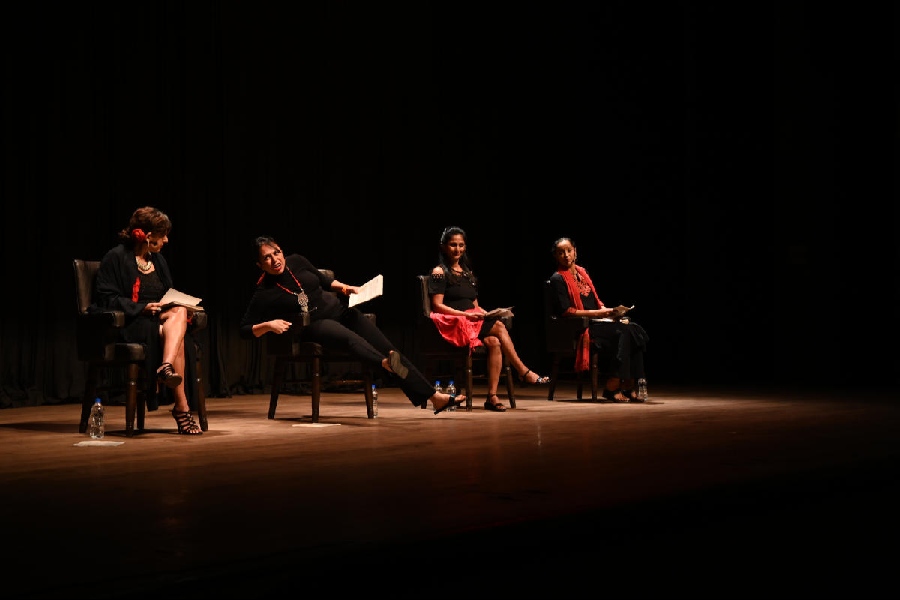The mention of vagina does not make it easy. Sponsors squirm, venue managers dither and the audience often comes expecting polished porn.
Despite all of this, The Vagina Monologues, an Indian adaptation of Eve Ensler’s award-winning off-Broadway theatre piece, has completed 20 years and over 1,000 shows.
The Indian version was first staged in 2003. Directed by stage veteran Mahabanoo Mody-Kotwal, it explores issues like sexism, rape, genital mutilation, orgasm and childbirth from a single perspective — a woman’s relationship with her vagina.
Minutes after a show at Kalamandir — where the four women on stage had the packed auditorium erupt into frequent applause — on October 6, Mahabanoo’s son said sponsors were still hard to come by.
“To find a sponsor has been very difficult. People said they would give money if we didn’t have the world vagina in the title. This has been going on since when we started approaching people in 2002. Even in 2023, so many people in high positions, largely men, in the corporate world think that vagina is a dirty word,” said Kaizaad Kotwal, co-producer and co-director of the play.
The Monologues have changed people’s lives.
On a flight to Delhi, Mahabanoo met a woman who walked out of an “abusive” marriage” after watching the play.
During another performance, a woman in the audience nearly fainted. “When she was much younger, she saw her uncle raping her 10-year-old sister. The play brought back the horrific memories,” said Mahabanoo.
At the beginning, Mahabanoo, her son and the other members of the team were apprehensive about the Indian audience’s response.
Initially, theatres refused to run the show and famous actors shied away from being part of it. Many mistook the play for a sleazy comedy. A top cop in Chennai refused permission for the show, anticipating “violent reactions” from the audience.
“My first producer backed away at the eleventh hour because a friend of his, a civil servant, warned that his reputation would be ruined if he got linked with the play,” Mahabanoo told Metro.
Kalamandir on Friday told a different story. Every now and then, the audience responded with loud cheers, with female voices at the forefront.
“I feel everything came from the gut. The four ladies — you were so powerful — it felt as if you were speaking my mind,” a viewer wrote in the comments book later.
Ensler had interviewed over 200 women from different parts of the world for the original script. Every monologue in the play draws from those stories.
The Indian version, while largely sticking to the original text, has brought in local context. A Jewish woman in the original is a Parsi woman here. The burger has made way for vada pao. Frank Sinatra, a woman’s favourite in the original text, has been changed to Kishore Kumar.
The play challenges the societal taboos surrounding the vagina.
One of the monologues has an elderly woman say: “It’s just a place, a place we don’t want to think about and a place we certainly don’t want to talk about.”
Another monologue, about childbirth, says: “The heart is capable of sacrifice. So is the vagina. The heart is able to forgive and repair. It can change its shape to let us in. It can expand to let us out. So can the vagina. It can ache for us and stretch for us, die for us and bleed, and bleed us into this difficult, wondrous world. So can the vagina. I was there in the room. I remember.”
Mahabanoo had taken ill and could not make it to Calcutta on Friday. The play was performed by Avantika Akerkar, Dilnaz Irani, Varsha Agnihotri and Swati Das.
A special monologue, called Rising, was presented by author Sreemoyee Piyu Kundu after the play at Kalamandir.
It was done to bring awareness about the movement called One Billion Rising — started by the playwright Ensler (who now goes simply by the letter V).
The movement gets its name from the UN and WHO reports that there are over one billion women on this planet who have faced physical or sexual assault.
